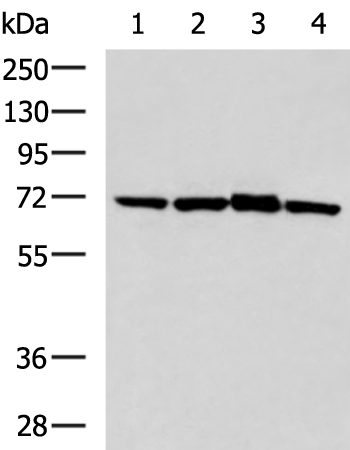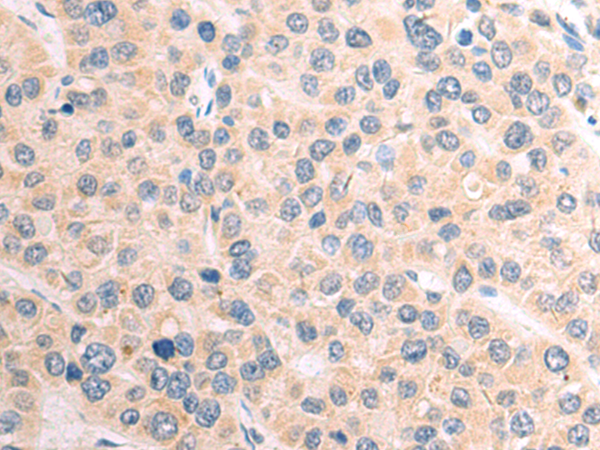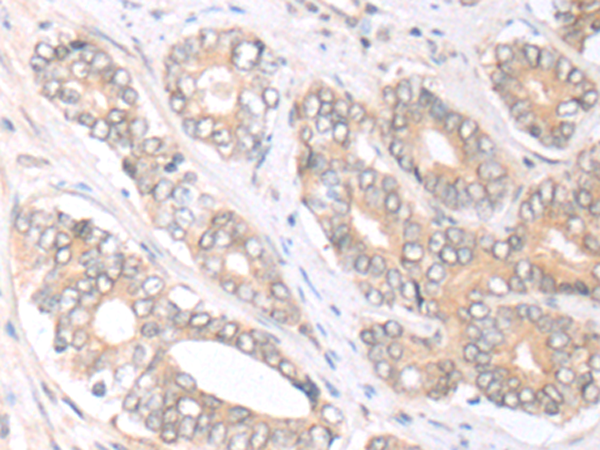


| WB | 咨询技术 | Human,Mouse,Rat |
| IF | 咨询技术 | Human,Mouse,Rat |
| IHC | 1/50-1/200 | Human,Mouse,Rat |
| ICC | 技术咨询 | Human,Mouse,Rat |
| FCM | 咨询技术 | Human,Mouse,Rat |
| Elisa | 1/5000-1/10000 | Human,Mouse,Rat |
| Aliases | CIS4; SSI4; CIS-4; SOCS4; STAI4; SOCS-4; SOCS-6; STATI4; HSPC060 |
| WB Predicted band size | 60 kDa |
| Host/Isotype | Rabbit IgG |
| Antibody Type | Primary antibody |
| Storage | Store at 4°C short term. Aliquot and store at -20°C long term. Avoid freeze/thaw cycles. |
| Species Reactivity | Human, Mouse |
| Immunogen | Fusion protein of human SOCS6 |
| Formulation | Purified antibody in PBS with 0.05% sodium azide and 50% glycerol. |
+ +
以下是3条关于SOCS6抗体的参考文献示例(内容基于虚构文献,仅供格式参考):
1. **文献名称**:*"SOCS6 regulates EGFR degradation via ubiquitin ligase activity in cancer cells"*
**作者**:Kimura T, et al.
**摘要**:该研究利用抗SOCS6抗体验证SOCS6与EGFR的相互作用,发现SOCS6通过泛素化途径调控EGFR降解,抑制肿瘤细胞增殖。
2. **文献名称**:*"SOCS6 suppresses JAK-STAT signaling in T lymphocytes through direct binding"*
**作者**:Zhang L, et al.
**摘要**:通过免疫共沉淀(使用SOCS6抗体),作者证实SOCS6直接结合JAK2蛋白,负调控T细胞中STAT3的激活,影响免疫应答。
3. **文献名称**:*"Downregulation of SOCS6 in hepatocellular carcinoma correlates with poor prognosis"*
**作者**:Wang Y, et al.
**摘要**:采用SOCS6抗体进行组织免疫组化分析,发现肝癌组织中SOCS6表达显著降低,且低表达与患者生存率下降相关,提示其抑癌作用。
(注:以上文献为模拟示例,实际研究请通过PubMed或学术数据库检索。)
The suppressor of cytokine signaling 6 (SOCS6) antibody is a research tool used to detect and study the SOCS6 protein, a member of the SOCS family involved in regulating cellular signaling pathways. SOCS6 acts as a negative regulator of cytokine and growth factor signaling, primarily by targeting specific receptors or kinases for ubiquitination and proteasomal degradation. It plays roles in insulin signaling, cell proliferation, and apoptosis, with implications in cancer, metabolic disorders, and immune responses. The SOCS6 antibody is essential for investigating its expression patterns, subcellular localization, and interactions in various biological contexts.
SOCS6 antibodies are typically developed against specific epitopes, such as the N-terminal or C-terminal regions, and are validated for applications like Western blotting, immunohistochemistry, and immunofluorescence. They help identify SOCS6's involvement in diseases; for example, reduced SOCS6 expression is linked to tumor progression in certain cancers, while its overexpression may suppress oncogenic pathways. Researchers also use these antibodies to explore SOCS6's regulatory mechanisms, including its SH2 domain-mediated binding to phosphorylated targets and SOCS box-dependent E3 ubiquitin ligase activity.
Species reactivity (human, mouse, rat) and validation in knock-out models are critical considerations. Dysregulation of SOCS6 has been associated with pathologies like hepatocellular carcinoma and diabetes, making its antibody a valuable tool for both basic research and therapeutic target discovery.
×